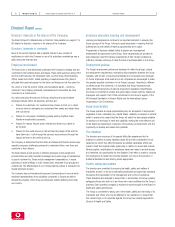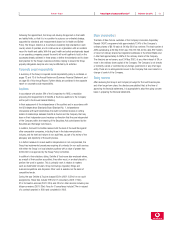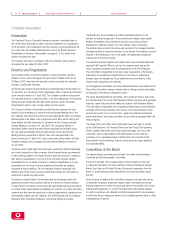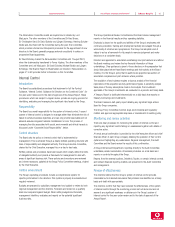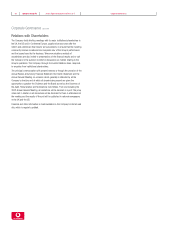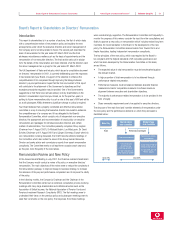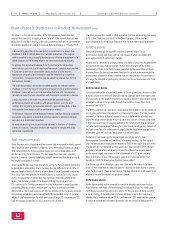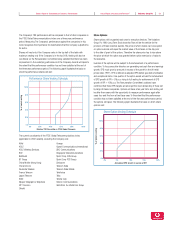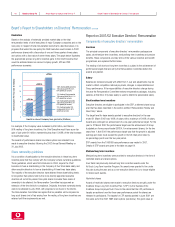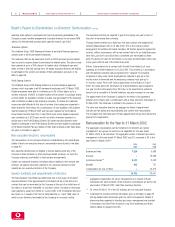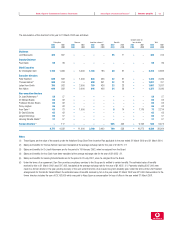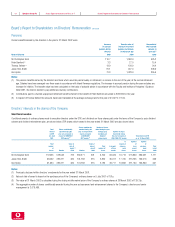Vodafone 2002 Annual Report Download - page 56
Download and view the complete annual report
Please find page 56 of the 2002 Vodafone annual report below. You can navigate through the pages in the report by either clicking on the pages listed below, or by using the keyword search tool below to find specific information within the annual report.
Vodafone Group Plc Annual Report & Accounts and Form 20-F Corporate Governance54
Corporate Governance
Introduction
The Combined Code on Corporate Governance requires companies listed on
the London Stock Exchange to make a disclosure statement on its application
of the principles of and compliance with the provisions of good governance set
out in the Code. The matters described below, and in the Board’s Report to
Shareholders on Directors’ Remuneration on pages 57 to 68, relate to the
position throughout the year.
The Company has been in compliance with the Combined Code provisions
throughout the year ended 31 March 2002.
Directors and Organisation
The Company’s Board of directors presently consists of fourteen directors,
thirteen of whom served throughout the year ended 31 March 2002. As at
31 March 2002, there were five executive directors and eight non-executive
directors, including the Chairman.
During the year, Henning Schulte-Noelle and Josef Ackermann left the Board, on
25 July 2001 and 19 February 2002, respectively. Vittorio Colao joined the Board
as an executive director on 1 April 2002. The Company considers all its present
non-executive directors, except Arun Sarin, to be fully independent. The executive
directors are Sir Christopher Gent (the Chief Executive), Julian Horn-Smith,
Peter Bamford, Vittorio Colao, Thomas Geitner and Ken Hydon.
The Company’s Articles of Association provide that every director who was
elected or last re-elected at or before the Annual General Meeting held in the
third calendar year before the current year shall automatically retire. Accordingly,
Michael Boskin, Paul Hazen, Penny Hughes and Arun Sarin will be retiring and,
being eligible, will offer themselves for re-election at the Company’s Annual
General Meeting to be held on 31 July 2002. The Company’s Articles of
Association further provide that every director appointed to the Board during
the year shall automatically retire and seek election at the next General
Meeting following appointment. Vittorio Colao, who was appointed to the
Board of directors on 1 April 2002, will be retiring and, being eligible, will offer
himself for election at the Company’s Annual General Meeting to be held on
31 July 2002.
The Board, which meets eight times each year, provides the effective leadership
and control required for a listed company. Actual financial results are presented
to each meeting, together with reports from the executive directors in respect of
their areas of responsibility. From time to time, the Board receives detailed
presentations from non-Board members on matters of significance or on new
opportunities for the Group. Financial budgets and forecasts are regularly
discussed at Board meetings. The non-executive directors periodically visit
different parts of the Group and are provided with briefings and information to
assist them in performing their duties.
The Board is confident that all its members have the knowledge, talent and
experience to perform the functions required of a director of a listed company.
On appointment, all directors are provided with appropriate training and guidance
as to their duties, responsibilities and liabilities as a director of a public and listed
company and also have the opportunity to discuss organisational, operational and
administrative matters with the Chairman, the Chief Executive and the Company
Secretary. When considered necessary, more formal training is provided.
The Board has a formal schedule of matters specifically referred to it for
decision, including the approval of Group commercial strategy, major capital
projects, the adoption of any significant change in accounting policies or
practices and material contracts not in the ordinary course of business.
The directors have access to the advice and services of the Company Secretary
and have resolved to ensure the provision, to any director who believes it may be
required in the furtherance of his or her duties, of independent professional
advice at the cost of the Company.
The executive directors, together with certain other Group functional heads and
regional Chief Executive Officers, meet on ten occasions each year as the
Group Executive Committee under the chairmanship of the Chief Executive.
This Committee is responsible for the day-to-day management of the Group’s
businesses, the overall financial performance of the Group in fulfilment of
strategy, plans and budgets and Group capital structure and funding. It also
reviews major acquisitions and disposals.
Two management committees, the Group Operational Review Committee and the
Group Policy Committee, oversee, together with the Group Executive Committee,
the execution of the Board’s strategy and policy.
The Group Operational Review Committee, which meets ten times a year under
the chairmanship of the Group Chief Operating Officer, comprises other executive
directors, certain Group functional heads and regional Chief Executive Officers.
This Committee is responsible for the operational performance and achievement
of targets of the Group’s business, with a focus on the enhancement of voice
services and growth of non-voice services, global new products and services,
brand development, technology and other cost and revenue synergies within the
Group’s regions.
The Group Policy Committee, which meets eight times each year, is chaired
by the Chief Executive. The Financial Director and the Group Chief Operating
Officer, together with certain other Group functional heads, join him on the
Committee, which is responsible for the determination of policy and the
monitoring of non-operational areas of activity which are important to the
Group overall, including strategy, finance, human resources, legal, regulatory
and corporate affairs.
Committees of the Board
The standing Board committees are the Audit Committee, the Nominations
Committee and the Remuneration Committee.
The Audit Committee, which usually meets on three occasions in the year,
is chaired by Paul Hazen. The other members of the Committee are Michael
Boskin, Arun Sarin and Sir David Scholey. Following his resignation from the
Board, Dr Josef Ackermann also resigned from the Audit Committee during
the year.
Under its terms of reference the Committee is required, amongst other things,
to review the Company’s preliminary results, interim information and annual
financial statements, to review the scope and extent of the activity of the Group
Internal Audit Department, to monitor the relationships with external auditors,
to monitor compliance with statutory and listing requirements for any exchange
on which the Group’s shares are quoted and to instigate special projects or other
investigations as it sees fit.










